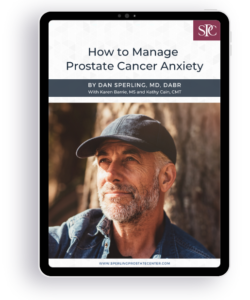“Anxiety does not empty tomorrow of its sorrows, but only empties today of its strength.” -Charles Spurgeon
Cancer brings anxiety
I have yet to meet a cancer patient who is completely free of anxiety. Even people who think they might have cancer start to live under the shadow of anxiety (“My mammogram showed something suspicious” or “My dentist said he didn’t want to scare me but I should get this sore on my nose looked at”). No matter how much doctors try to reassure patients during detection, diagnosis, or treatment, complete release from anxiety comes when the patient finally hears, “It’s not cancer” or “I got it all and the cancer is gone.”
Holding off on prostate cancer treatment
Prostate cancer patients often face a dual anxiety:
- If they don’t get treated, the cancer might grow and spread.
- If they have a whole gland treatment, they may end up leaking urine or unable to get an erection – at least for some period of time, but maybe even permanently.
Recently, an alternative to immediate whole gland treatment has been gaining traction. Active Surveillance (AS) is a way to manage early stage, low-risk prostate cancer while holding off on definitive treatment. This growing movement has largely come about due to the recognition that countless men have been over treated at the expense of their urinary and/or sexual function.
Today’s patients turn to the internet for information and to learn from each other’s experience. They wonder why they need a radical prostatectomy if they only have one small spot of disease that appears to be localized. While they want to get rid of the cancer, they also worry about 1) weeks, months or years of wearing pads for urinary leakage, and 2) taking pills or injecting themselves in the penis to achieve an erection.
For patients with small volume, non aggressive disease, AS holds out the attraction of deferring treatment while monitoring their PCa by means of PSA blood tests at regular intervals, imaging with multiparametric MRI (mpMRI), and targeted biopsy if indicated by PSA and mpMRI. They and their doctors determine in advance what clinical factors will “trigger” definitive treatment.
Besides holding off on treatment with its risks of urinary and sexual side effects, AS provides time and imaging for a doctor to become familiar with the patient and his cancer, which will help with choosing a treatment when the time comes. In addition, most AS patients actually improve their overall health by improving their nutrition/supplements, losing weight, exercising regularly, and managing stress better—since there is ample research evidence that such lifestyle changes have the potential to slow prostate cancer down.
What’s the catch? It’s anxiety
But there’s a catch. According to a recent study of 413 AS patients who completed follow-up questionnaires, “Men undergoing active surveillance for prostate cancer experienced levels of anxiety that were moderate, but that decreased over time…”[i] While the authors of the study found that patients and their families gradually became less anxious, especially since monitoring is close and consistent, one commentator noted that AS still poses challenges in terms of patients’ and families’ emotional needs. Dr. J. Brantley Thrasher, a professor of urology at the University of Kansas Medical Center, cited another study of AS patients who decided to go off the program:
… those electing to leave the program had higher baseline PSA levels and younger age… [T]his subset of men continued to feel anxious about their cancer …Additionally, the attitudes and worries of family members and loved ones were potential influences on the decision to leave the AS program.[ii]
I suspect that even with the best patient education, counseling, and accurate information about the safety and advantages of AS, it will not be enough to relieve the anxiety of those who psychologically can’t live well with the idea of cancer in their body. They would rather face the side effect risks of prostatectomy or radiation than hang in with AS.
Focal laser ablation as the antidote to AS anxiety
When it comes to alleviating anxiety without having to go through radical treatment, the Sperling Prostate Center offers a happy medium. MRI-guided focal laser ablation destroys the PCa with minimal-to-no risk of urinary or sexual dysfunction. It does so by precisely targeting the tumor (and a margin of safety) with lethal heat, all the while preserving healthy gland tissue and normal prostate function. This resolves the anxiety dilemma of over-treatment vs. delayed treatment.
Our patients matter to us on all levels, not just physical health. We know that emotional and psychological well-being is just as much a part of medical care as destroying tumors. There is no reason to live with anxiety when focal laser ablation can solve the problem.
Download Our Free Ebook: “How to Manage Prostate Cancer Anxiety”

Don’t let anxiety over prostate cancer run you. Instead, learn how you can take charge and empower yourself to manage stress and boost positive treatment outcomes with our “first aid kit” of practical tips and tools.
[i] Bowser, Andre. “Active surveillance linked with moderate anxiety.” Urology Times, Feb. 1, 2018. http://urologytimes.modernmedicine.com/urology-times/news/active-surveillance-linked-moderate-anxiety?cfcache=true&rememberme=1&elq_mid=496&elq_cid=2002602&GUID=DBEA56F3-EB3A-42E2-A5EF-D711610A8329
[ii] Thrasher, J. Brantley. Challenges remain for active surveillance in low-risk PCa. Urology Times, Feb. 1, 2018. http://urologytimes.modernmedicine.com/urology-times/news/challenges-remain-active-surveillance-low-risk-pca?cfcache=true&rememberme=1&elq_mid=496&elq_cid=2002602&GUID=DBEA56F3-EB3A-42E2-A5EF-D711610A8329


